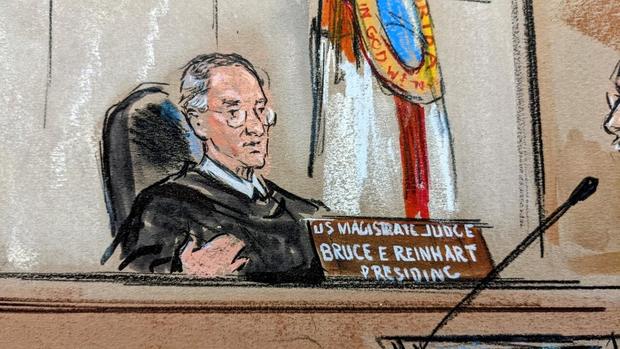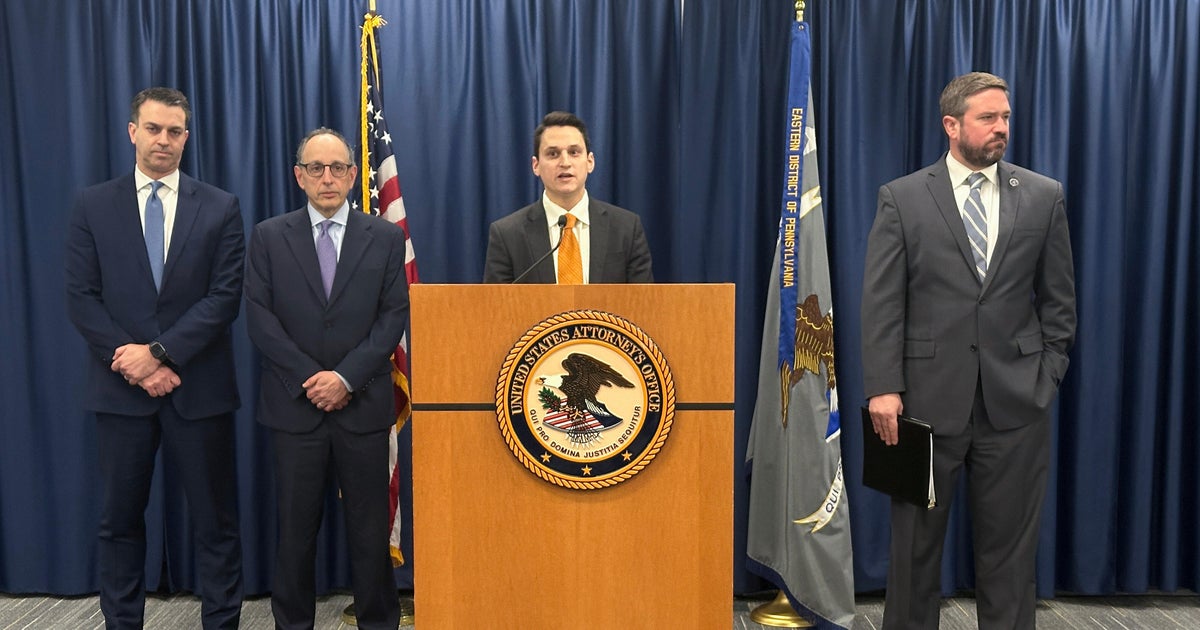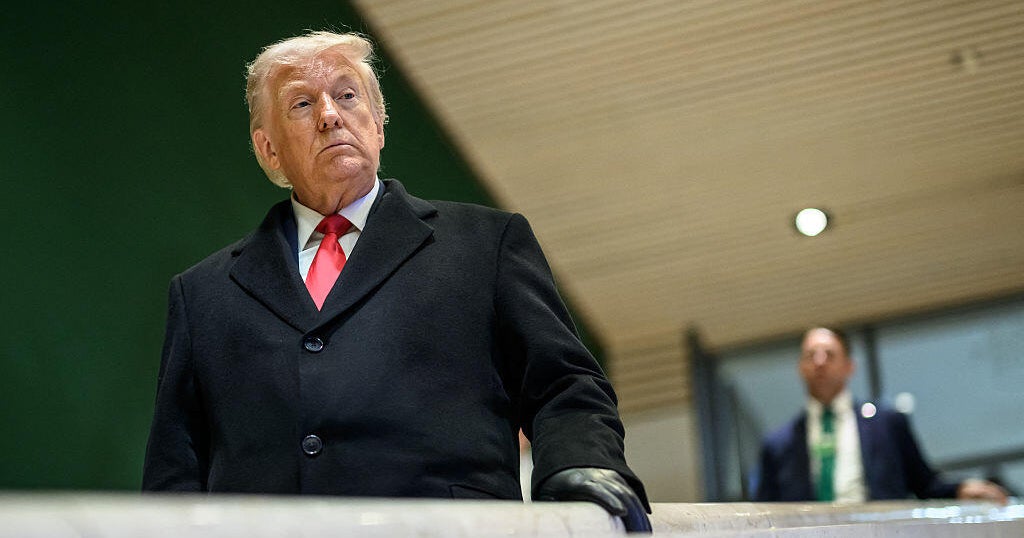Bruce Reinhart unsealed: The magistrate judge at the center of the Justice Dept's inquiry into Trump's handling of classified records
The third week of March 2018 was a momentous one for the Reinhart-Bell family.
That Monday, Florida's then-Governor Rick Scott appointed federal prosecutor Carolyn Bell to serve as a state circuit court judge.
Days later, Bell's husband — Bruce Reinhart — was sworn in as a federal magistrate judge in South Florida, beating out 63 other candidates for the job.
Quite a week, but nothing compared to the week they just had — and perhaps the ones that lie ahead.
Since Reinhart approved an FBI warrant that authorized a search of former President Donald Trump's Mar-a-Lago home, he and his family have become the target of violent threats from right-wing internet trolls seeking to discredit and intimidate the judge.
His address and personal information were posted online. "I see a rope around his neck," wrote one poster on a pro-Trump site. Anti-Semitic threats followed.
"This is truly an awful situation and completely undeserved with someone who is just trying to do his job. And to be personally attacked is just absolutely wrong," said Michelle Suskauer, a family friend of more than 15 years.
Late last week, Reinhart unsealed the search warrant and on Thursday, heard arguments from media organizations and the Justice Department, battling over whether to release the warrant's underlying affidavit. That document explains the government's reason for seeking the search warrant and currently may be the nation's most politically charged pieces of paper.
Reinhart said he was open to unsealing at least some portions of the affidavit and asked the government for suggested redactions.
In the courtroom, a lawyer for media organizations seeking to make the affidavit public told Reinhart, "I get paid to be nosy sometimes."
"I get paid to say 'no' sometimes," Reinhart quipped.
Friends and acquaintances say that sort of congenial, yet quick retort is vintage Reinhart. Those who have spoken with him since last week told CBS News he remains unfazed by the political vortex swirling around him and the threats he now faces.
South Florida defense attorney Bruce Zimet has known Reinhart professionally for close to 20 years and had a case before Reinhart last Thursday.
"He conducted himself as usual," Zimet said. "If there were other things on his mind, it didn't show in the proceeding I had in front of him."
Another source told CBS News Reinhart now has a security detail provided by the U.S. Marshals and is taking the threats seriously, but is resolved to adjudicate the Trump matter as he would any other case before him.
Reinhart, 60, grew up in Somerville, New Jersey, attended Princeton as an undergraduate and law school at the University of Pennsylvania. He clerked for a federal judge before a stint in the public integrity section of the Department of Justice and two years as senior policy adviser at the Treasury Department. Between 1996 and 2008, Reinhart served as a federal prosecutor in South Florida.
Reinhart's wife, Bell, is a juvenile court judge, and they met when both worked at the Justice Department.
In 2008, Reinhart went into private practice, specializing in white collar criminal defense. One of his clients was a Florida police officer convicted of using excessive force against a suspect and violating that suspect's civil rights.
For a time Reinhart shared West Palm Beach office space with attorney Jack Goldberger.
"Without hesitation, if I had a situation where I needed another in a case I was involved in, I didn't even think about anyone else. I would automatically go to Bruce. Automatically," Goldberger said. Together, they worked on several health care fraud cases.
Goldberger has represented an assortment of high-profile clients, including New England Patriots owner Robert Kraft and the late, disgraced financier Jeffrey Epstein, though Reinhart was not part of either defense team.
But Reinhart has drawn scrutiny for ties to Epstein. Shortly after leaving a senior role at the U.S. attorney's office in 2008, Reinhart defended employees for Epstein, including his scheduler and pilot. Reinhart said he was not part of the team at the Justice Department investigating Epstein and denied that he was privy to information about the case that could have caused an ethics conflict, the Miami Herald reported.
"Even assuming I had participated 'personally and substantially' in the Epstein investigation [which I did not], the relevant Department of Justice regulations only prohibited me from communicating with, or appearing before, the United States on behalf of Mr. Epstein,'' Reinhart said in a 2018 email to the Herald.
Reinhart and Goldberger are regular lunch companions, typically choosing greasy spoons and gyros over fine dining. Goldberger said he enjoys attending sporting events and playing golf with Reinhart, though he admits neither is very good. "Thank God practicing law is our day job for both of us. Neither of us are so spectacular out there."
Reinhart sits on the board of his local synagogue –- a fact that drew anti-Semitic comments online. One 4chan user wrote about Reinhart, "That is a k**e. And a pedophile…He should be tried for treason and executed." In the wake of the threats, the synagogue canceled an event last week, according to multiple reports.
There's limited public evidence about the judge's political leanings, despite the rash of accusations of partisan malfeasance. He donated $2,000 to support Barack Obama in 2008 and $500 to Jeb Bush's failed run for the presidency in 2015, according to federal elections records.
Reinhart did not comment for this story but his social media posts offer some clues about his views on the law and politics.
In a 2017 tribute to his mentor Norma Shapiro, the judge for whom he clerked early in his law career, Reinhart wrote, "Every day, in ways big and small, she tried to help people. I try to honor her by doing the same."
Reinhart's profile picture is a New York Giants helmet and most posts are fairly ordinary and apolitical — family updates ("Our minivan days are officially over!"), links to news articles and occasionally photos. He appears to have stopped making public posts once he was sworn to the federal bench.
In one post he wrote it was, "embarrassing to live in a state [Florida] that is less enlightened on criminal justice than Louisiana and Mississippi." The comment was appended to a 2017 article about Louisiana's new criminal justice laws.
There is one reference to Trump, whose case is before him now.
Just before the 2017 inauguration, Reinhart reacted to President-elect Trump's tweet about civil rights crusader and congressman John Lewis. Trump tweeted Lewis was "All talk, talk, talk — no action or results. Sad!"
Reinhart responded on social media, "I generally ignore the President-elect's tweets, but not this one. John Lewis arguably has done more to "make America great" than any living citizen."
He added: "Thank you, [academic and former cabinet secretary] Robert Reich, for saying what many of us feel, "John Lewis is the conscience of America. Donald Trump doesn't have the moral stature to kiss John Lewis's feet."
Reinhart's bio on the court's webpage was temporarily disabled after the Mar-a-Lago search made headlines, but it has since been restored.
"The threats against him are just outrageous. They should be denounced by everybody," said defense attorney Jon Sale, who argued cases against Reinhart when he was an assistant US Attorney and called him "fair" and "independent" when it comes to politics.
As a magistrate judge, Reinhart has presided over cases ranging from disputes over Google's attorney fees to a Social Security fraud case against a woman once crowned Mrs. Florida. Karen Turk pleaded guilty to one count and Reinhart sentenced her to one month in prison.
The Mar-a-Lago search warrant is not Reinhart's first brush with Trump in his role as a magistrate. The former president claimed in a lawsuit filed this March that Hillary Clinton and Democratic allies conspired to make false statements about Trump's ties to Russia during the 2016 campaign.
Reinhart was assigned the case in April, but recused himself by mid-June. It is not clear why.
Magistrates are not selected by the president and confirmed by the Senate like other jurists in the federal system. Instead, they're appointed by a majority vote of the U.S. district judges on each court.
Federal magistrates issue warrants – like that issued in the Mar-a-Lago case – and handle preliminary criminal matters like arraignments, initial appearances, and arguments over the pretrial detention of a defendant. Unlike "Article III" judges before whom criminal and civil cases are tried, magistrates are not usually tasked with presiding over full judicial proceedings and issuing binding rulings.
According to the official federal U.S. Courts website, "magistrate judges must meet specified eligibility criteria, including at least five years as a member in good standing of a state or territory's highest court bar." A merit selection panel of lawyers and community members also vets them.
Reinhart did not choose to preside over the Mar-a-Lago case; magistrates are assigned at random. As in any other case, Reinhart would have had to look at the evidence presented to him by prosecutors and investigators — including the affidavit at issue — before authorizing the search warrant of Trump's estate.
Speaking with CBS News affiliate WFOR, former federal prosecutor David Weinstein said of Reinhart, "Remember, he's seen everything in this affidavit. He had to have seen it because he read it and determined that there was probable cause retained within it."
People interviewed for this article described Reinhart as a meticulous lawyer and a straight arrow, someone who generally avoids discussing politics and maintains his professionalism inside and outside the courtroom. They cite his past service on a Palm Beach County ethics panel as an example of his integrity.
"He's almost out of central casting for what you expect a magistrate judge to be," Zimet said.
Since the FBI searched Trump's Mar-a-Lago last week, federal authorities have warned of an increase in threats to law enforcement and government officials.
The threats, which are "occurring primarily online and across multiple platforms, including social media sites, web forums, video sharing platforms, and image boards," were identified by the FBI and Department of Homeland Security in the days following the search.
Earlier this week, a western Pennsylvania man was charged with threatening to assault and murder federal law enforcement officers, posting vulgar and violent messages online in the days after the FBI descended upon Mar-a-Lago.
"Every single piece of s*** who works for the FBI in any capacity, from the director down to the janitor who cleans their f****** toilets deserves to die. You've declared war on us and now it's open season on YOU," Adam Bies allegedly wrote on Aug. 10. Bies, who has since been indicted on 14 counts for the alleged threats, pleaded not guilty Thursday.
Attorney General Merrick Garland, a former federal judge himself who announced the Justice Department's desire to unseal the search warrant for public viewing, said last week of the "unfounded" attacks on law enforcement and government officials, "I will not stand by silently when their integrity is unfairly attacked. The men and women of the FBI and the Justice Department are dedicated, patriotic public servants."
Nicole Sganga contributed reporting from West Palm Beach, FL.






